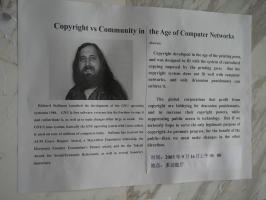
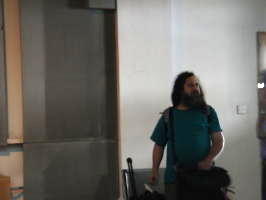
胖鸭子
演讲文字最近更新:2007年5月9日
感谢evermore提供数码相机,
感谢justajoke提供数码录像机,
感谢th507协助拍摄,
感谢eagle4抓取DV,
感谢于仕琪转压视频,
感谢Mark Smith (马克・史密斯)纠正部分听写错误。
今天上午,Richard Stallman在中科院软件所作演讲,题目是 Copyright VS Community in the Age of Computer Networks。我只是昨晚在水木得到的消息,当然不能错过了。我七点多起床,九点钟第一个到了报告厅门口,一个人也没有。说是十点的演讲,但是九点半了报告厅的门才打开,之前我们先来的还怕rms不来了呢。rms进来时候,才稀稀拉拉坐了十来个人。


最后,rms说到自己对自由软件的前景并不乐观,要继续努力。他说:
I am not an optimist, but I will keep on fighting.
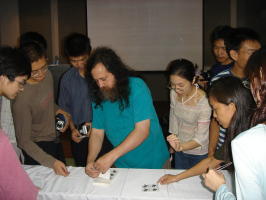
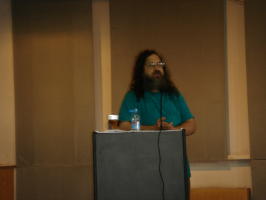
Mr. Stallman, I read and translated your article `science must push copyright aside' last year, but I am still puzzled. If the big companies give out their patents and copyrights, they will lose money. Is it still feasible for them to do that? Thank you.
原来我也把Patents和Copyright混淆了,还好rms指出了我们的错误。
有人问rms对Gentoo创始人兼原首席设计师Daniel Robbins去微软的看法,rms说这样的人不珍惜自由(value their freedom),他还提到Gentoo里面包含了非自由的软件。问到rms怎么生活,他说他主要靠演讲的收入,他的多数时间在旅游,到哪里都会有人帮他支付费用。当时让我羡慕了一把。我前一天就准备好的问题没有问成,就问了另一个问题:
Will GPL 3 be more stricter or less stricter than GPL 2? When will it be out? Thank you.
其实我是为提问而提问,这个问题的答案在网上就可找到,我只是想和rms对话罢了。rms说,有的地方会更严格,有的地方会更宽松,但他们还是一样的(指都为了保证计算机使用者应得的自由)。
有人问到了Hurd的情况。有人要求rms展示一下他的桌面,rms说,没有必要,他用的是文本界面,那样更高效,他的主要工作是收发电子邮件。据LittleFish说,rms的电脑是IBM的T4?,看不清楚后面一个数字。
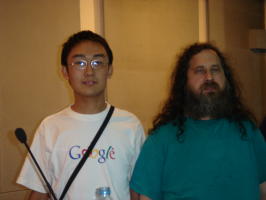
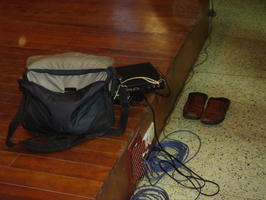
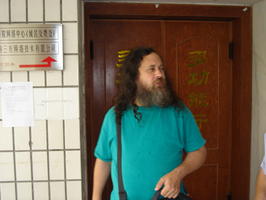
And the idea of the free software movement is that users of software deserves certain freedoms: the freedoms to study and change and redistribute and run the software that they use. They should be able to do these things in freedom, and no one should have the power to restrict them.
And so in January 1984, I began developing the free software operating system called GNU, which stands for GNU's Not Unix. By 1990, we had all the necessary pieces for the GNU system except for one important piece the kernel. And before we finished our kernel, someone else named Torvalds finished another kernel. He made another kernel. And in 1992 he made it free software. So people began using a system which was basically GNU with Linux as the kernel. This system, which is GNU with Linux added, is often unfortunately referred to as Linux. But that's the narrow.
The system is actually basically GNU. In any case, the result was that the GNU system started to become popular, millions of people started using the GNU system, and they started to hear about free software, and they started inviting me to give more speeches about the free software movement and GNU systems.
And in these speeches, people would sometimes ask me whether the same ideas apply to anything but software. For instance they would say what about microphones?(pointing to his mic) Should they be free? What about computers?(pointing to his laptop) Should they be free? What about chairs?(pointing to the audience) What about cars?(pointing to the wall) Well, what does that question mean? We have to look at the definition of free software.
What does it mean for software to be free? It means that the user has four essential freedoms. Freedom zero is the freedom to run the program as you wish. Freedom one is the freedom to help yourself, that's the freedom to study the source code of the program and change it to what you wish. Freedom two is the freedom to help your neighbour, that's the freedom to make copies and distribute them to others. And freedom three is the freedom to help your community, that's the freedom to distribute modified versions when you wish.
So, if we ask should microphone be free, do the same ideas apply to microphones? That means should the user of a microphone have the same four freedoms? Well, let's look at them.
Freedom zero, the freedom to use it as you wish. For the most part, if you have a microphone, you are free to use it as you wish. Then there is freedom one, the freedom to study the source code and change it. Well, there is no source code, this is a physical object. It wasn't made by compiling it. But you are free to change the microphone if you bought it. You can change it. You buy a chair, you can change it. If you buy a car you can change it, and lots of people do, in the case of cars, lots of people do. Then there is the freedom to copy and distribute copies, freedom number two. Well there are no copiers for microphones, your cars, your computers, your chairs, they are physical objects. And only in science fiction are there copiers for physical objects. The people who manufacture microphones, your computers, your cars, they do not do it by putting a model into a copier. That's not how things work. So that's a meaningless question. And then freedom three is also meaningless. Yes you could modify your car or microphone or chair, but there is no copiers to make copies of it. The only way to get fifty modified cars is to make them one by one.
So these physical objects in general are as free as could possibly be, given the Linux of the physical world and technology. But the question does make sense if your ask about other kinds of info....
... Well, if required the equipment you need to write, but everyone who knew how to read and write would have that. And another consequence was no inherent economy of scale: to make ten copies of a book took ten times as long as making one copy. The result of this was a system where anybody who had a copy and wanted another would copy it, a completely decentralised system of producing copies of books.
As far as I can tell, in the ancient world there was no idea of copyright, nothing like it. If you had a copy and you wanted to make another copy, no one was going to stop it. However, after the ancient world ended, later on there was an advance in copying technology: the printing press with movable type. And this made copying much more efficient, but not uniformly. Some kinds of copying became much more efficient, while the others were not affected, because you wouldn't use the printing press for them.
Specifically, the printing press was only useful for making many identical copies, because it took a lot of work to set the type. But once you had done that, you could make many identical copies very quickly and easily. So the result was, the printing press was only useful for mass production of identical copies. If you wanted just one copy of something, you would probably just write them, 'cause that would be more efficient than using a printing press.
Another consequence was, that this new efficient mass production of copies required a lot of expensive equipment: the printing press and the letters. So, most people who could read and write did not have printing presses, and they didn't know how to use one either. So the result was ...
... stopped and they object to being forbidden. So copyright law is no longer painless. It is no longer uncontroversial, and it's no longer painless and easy to enforce because now it's being enforced against ordinary people, against people like you. And this requires invading people's homes, invading people's computers and imposing nasty punishments on ordinary people, often on children or their parents. And finally, it's no longer an arguably beneficial deal. You see, it used to be a beneficial deal, because the public traded a freedom that it could not exercise, and if it exchange for that, it got some benefit that would all gain. But ...
我知道今天下午rms有活动,没有想到上午也有,很是感叹他的精力,整个行程都被公共活动占满。十六号晚上我才在BBS得知第二天上午还有演讲。今天上午的演讲在中科院青年公寓,我还是早早到那里,坐在了第二排,因为这是最适合录像的地方,第一排太近了。早起的鸟儿有虫吃。
比起前一天的演讲,这次到场的人多多了,教室前门后门都挤满了人,rms到门口,看到这么多人,提议换个大的教师。我听到后,立刻收拾东西,准备跟随他去占好位置。由于事先没有准备好的大场地吧,还是没有换教室。还是不换的好,要不然我可能就没有这么好的位置了,虽然后来的拍摄还是没有能很够很完美。
昨天的演讲是针对中科院软件所的,所以题目比较专。今天是中科院自由软件协会组织的,听众范围比较广,所以主题也比较泛泛,rms谈了自由软件的很多方面。rms很能讲,一讲就是一个小时,还不包括提问。他的声音很好听,语速不快,但是话语很坚定。前一天光线暗,照得不好。这次在教室,光线很好。
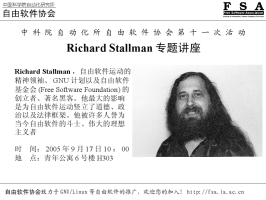

我是第一个提问的。我刚说: Emacs is open source,就被他打断了,他说他不提open source,他说的是free software。我的问题是:
Emacs is open source, and it's ported to Windows. But Windows is proprietary operating system. Should free software writers continue to port their software to proprietary platforms?
本来我要问的是 Should open source software writers,但是rms不喜欢open这个词,我就只好改说free software writers了。rms说,这样做有好处也有坏处。好处是推广了自由软件,坏处是让有的人停留在了私有操作系统上,因为他们在其上也可以用到自由软件,不过总体上,这样做推广了自由软件。这几段是演讲后一个礼拜写的,我已经忘了别人提了什么问题。以后应该尽早回忆。
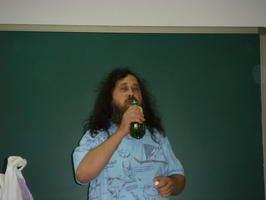
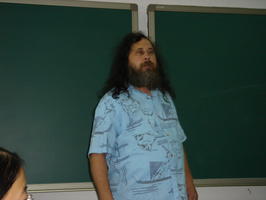
提问结束后,rms要让大家看看他的另一种身份。他拿出一件长袍穿起来,应该是神父之类穿的吧,还戴了一顶独特的帽子。他说这帽子是他的光环(halo)。
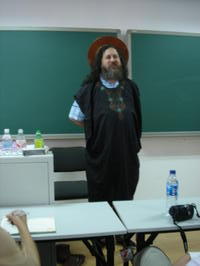

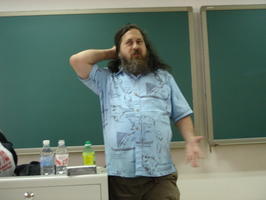
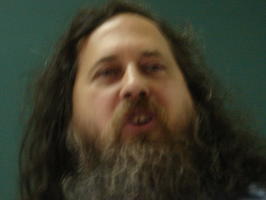
... ?? to the job of five features, I am told that it's not you see ?? it, it's not finished, but it will be. And I am told we have something like 89 percent of Classpath down. Well, this is good news. Maybe in a year or two, it will be all working. Of course, Sun keeps making more standard Java libraries, and they are all nonfree, except for a few of them. So we gonna have to replace all of them. And they keep making more, so will never be finished. But that's all right. So if you like the Java language, one very useful way you can help is by working on replacements for free Java libraries. Contact the maintainers of GNU Classpath, and offer them help. Because this is your communities' software. Your community built it, and we need your help to keep building it further. This is human knowledge, and you have to contribute to it if your want to grow up.
But we face other kinds of obstacles too. For instance, many people, many organizations, send other people files in Word format. Now Word format was secret. People had to figure it out with boring ?? experiments.
You know, change the text a bit, save it, look at the file see how it is different now. Change the text a bit more, save it, look it again. That's how it figure it out what Word format consists of. And finally now there are free programs that can read and write Word format files.
So Micro$oft is changing it, and this time it's patented. So Micro$oft can sue any body who releases free software that supports that format. So why should we care about this? Well, if one tenth of the users send every else word files, and our software cannot read them, the other ninety percent people they could take two possible responses. If their have learned to value their freedom, they will say: "I am not gonna to install that stinking user subjugating Micro$oft software, stop sending me Word files!" That's what they would do if they value their freedom. But most have never heard of this issue of freedom, so instead they are going to say: "It's more convenient to use Micro$oft Word, because it can reword files."
See, it's the same situation but depending on your values of different ways you can respond to them. So it's a big problem. And that's why we have a campaign asking people to refuse to read word files. There is free software that can read Word files. I do not have it on my computer.
And when somebody sends me a Word file, I do not try to look at what it says. I do not ask someone to read it for me. I just send it back it with an explanation saying why are you sending me Word files? And you can do this too. Every time we convinces somebody to stop sending Word files to other people, we reduce Micro$oft's power.(people laughs) Every person who makes and sends Word files to other people is an agent of Micro$oft, magnified by Micro$oft's power. And this applies to any other file format that's secret or restricted. People should use publicly documented format that everyone is free to implement.
There are websites that can only be accessed with Internet Explorer. This is very bad. A few weeks ago, or a month ago, the US Copyright Office was asking whether it would be OK if they setup a website that can only be accessed by Internet Explorer. So the FSF organised people to write in and complain and say no that it would be not all right. So people emailed us their letters and we prepared ?? six copies of each one and delivered them to the Copyright Office. And after New Orleans was drowned, because Bush cut the money to protect the city. This is well-known. Bush wanted money to rewarding his colonies and trying to occupy another country. So he cut his standing to lever New Orleans. And they were telling us if a hurricane comes here, the cities' gonna be sunk. And it was. Anyway, people discovered that the website of the Emergency Office. They did such a bad job that Bush was ??? it all along, it's only accessible with Internet Explorer.
So now we have a campaign to complain about this. And we are targeting to other websites with public pressure to support every browser, to use standard HTML, and other publicly documented formats that everyone can use. This is another way you can help. You can organize a compaign like this. This compaign can be worldwide, when the websites get worldwide attention. So a large compaign may sometimes succeed.
We also face threats from laws that prohibit free software. For instance, in the US, there are two different laws that prohibit free software. The most dangerous one is patent law. In the US, any software technique or feature can be patented. Now if you look at a word processor, you'll see hundreds of different features, and each of these features is at least one idea of technique. In some cases, one feature may involve many user interface ideas or many internal techniques. So, one feature could be covered by several different patents more than once. And there are also techniques that are used internally that you do not see as features. But they could be patented too.
For instance, one example of a little thing can be patented is the progress bar. It appears and gradually fills up to show you how much job has been done. That's patented. That's an example of a little technique, a little wragle ?? , a little idea that gets patented over time. So in a large program, there are thousands of those ideas. So a large program is born to have hundreds of patents. It's inevitable. And it's not even feasible to find out where they are. It's too much work. There are hundreds of thousands of software patents. Nobody, unless it's full time ?? can study them all. So software development are ?? the sister of software patents. It's dangerous. With every design ...
... already do with GNU + Linux, so it didn't air anything. So it it wanted to contribute, they should free it in 1990. Well, it's still the right thing to do. You know, once it's free software, I will not do anything more. But it's not a big good did. If they want to make a big contribution, that they should free something that we do not have. Actually Sun did that. Sun did that in another instance Openoffice. So I don't want to make a sound like condemning Sun particularly, 'cause Openoffice was a big contribution and still is a big contribution to our community. ...
Free software means software that respects the user's freedom, so it's free in the sense as free speech, not in the sense of free beer. So, say 自由 not 免费.
When software does not respect your freedom, it is non-free software but proprietary software. Proprietary software tramples the user's freedom. It keeps the users divided and helpless. Divided, because everyone is forbidden to share with anyone else, and helpless, because the users don't have the source code, so they cannot change anything. They cannot even tell what the program is really doing. So they are under the power of the software developer, and this is injustice.
And the aim of the free software movement is to put an end to this form of injustice, to make sure that all software users have the essential freedoms, so that they are not divided and not helpless. What freedoms are they? We have to be more specific.
There are four essential freedoms that make the definition of free software. Freedom zero is the freedom to run the program however you wish. Freedom one is the freedom to help yourself, that's the freedom to study the source code and change it to do what you want. Freedom two is the freedom to help your neighbor, that's the freedom to make copies and distribute them to others. And freedom three, is the freedom to help your community, that's the freedom to distribute modifide versions when you wish.
So all four of these freedoms are essential and each of them means there is a certain thing you can do when and as you wish. You are not required to do any of these things but you are free to do them. And you could do them when you wish.
Why are these freedoms essential? Why do we find free sofware this way? Freedom two, the freedom to help your neighbor, the freedom to make copies and distribute them to others. This freedom is essential on basic moral degrees. So you can be a good neighbor, be a good person, be a good member of the community.
If you are using a program that does not give you freedom two, then you are in danger of falling into a moral dilemma at any moment. Whenever your program says "that's a nice program, may I have a copy?", at that point you are in the dilemma because you have to choose between two evils. One evil is to give your friend a copy and violate the license of the program, the other evil is to deny your friend a copy and comply to the license of the program. So, once you are in that situation, you have to choose the lesser of the two evils. The lesser evil is to give your friend a copy and violate the license.
Now why is this evil lesser? The reason is this evil is directed to somebody evil, somebody who has attacked your community, try to deliberately to divided you from you from your friends, who has attacked the social solidarity of your community. Now that's a very bad thing. So if you cannot help doing wrong to somebody, ... him, rather than your friends, we can presume your friend is a good person and has treated you well and deserves your cooperation.
Of course, if could be that this person is not your very good friend , people you wouldn't want to help. But that's an easy case. If a person is nasty asking for help, you just say no. So that's an easy case. is the case your friend deserves your help. .. that's a case that really put you to a dilemma. So, the lesser evil ?? your inner situation is to help your friend.
But, being a lesser evil does not mean it's good. It's never good to make an agreement and do not keep it. It may be better than your alternative, but that's not good. And the only thing in software that's worse than an unauthorized copy is to proprietary program is to authorized copy. That's usually worse, because it helps all the evil thing that's attached to it. And in addition the developer is usually being rewarded. So the ... is that shouldn't happen.
So, once you have understood this dilemma, what you should really do is to make sure you do not get into it. And that mean there are too many ways to do that. One way is don't have any friends, and that's probably what the proprietary software developers want you to do. They do not want people to be friends. The other way is don't use proprietay software, don't use this program. If a program is going to put you someday in a moral dilemma, you shouldn't use it. Once you understand that if you use this program, someday you will be in a moral dilemma. The way to avoid both evils, avoid dilemma is do not use that program. When some one offers it to you, say no.
Once John Perry Baulon was giving a speech, he asked the audience if you have no unauthorized copies of software, please raise your hand. And he expected nobody would raise his hand, but somebody did. And ?? was me. And he said "Oh you Stallman of course". Because he understood all my copies of software are copies of free software. And everybody can make authorized copies.
The most essential resource of any society is not physical resource. It's a cycle social resource. It's the spirit of good will. The spirit of ??. help your neighbor, this makes a little difference because a society a doggy doggy jumbo. And it is no accident that the world's major religions have explicitly for thousands of years. Even the small increase in the level of the ... makes life better for everyone. So what does it mean when powerful socialist tutions say it's wrong to share with your neighbor, what they doing? They are poisoning this essential resource, something that no society can afford. There's no society in the world that has too much ?? And what does it mean when they say if you share with your neighbor you are pirate. Pirates attack ships. Pirates is a big prolem. Piracy is a big problem in the sea nowadays but has nothing to do with computers. They use guns. And when they try to equate helping your neighbor with attacking a ship, they couldn't be more wrong. Because attacking ships is very bad, but helping your neighbor is ??. So there expressing a twisted sick morality. We should reject the item "pirate". Whenever someone tries to call unauthorized copies pirates, we should say no, pirates is attacking ships, we are talking about sharing.
And what does that mean when they posed punishment? yeals for prison? having unauthorized copies of proprietary software. How much fear is it going to take before your frineds are too scared to share with you, or before you too scared to share with them? If you do not want that kind of fear, to prevent your society, you got to do something about it. The terro campaign of prorpietary software must be ended. And I use the `term terror campaign' without exaggeration. You see, two countries already have threatened people with rip for having unauthorized copies of proprietayr software. And when they start threaten people with rape, they terror thing.
(A cell phone rings) Oh, if you carry a personal tracking and surveillance device, please switch it off. They have already tracked you here. So they already know that you are in this room and you need to keep it switch on anymore. I just do not have one. I don't want to be tracked.
So, those are the reasons for freedom number two. The freedom to help your neighbor, the freedom to make copies and distribute them to others. Freedom zero is necessary for different reason so that you can control your own computer. It may be shocking that there are proprietary program that actually restrict you how you can run your copy even its some authorized copy. They restrict how many people can run it on your computer at the same time, how much you could use it or what you can use it for. and ???????????????? so freedom zero, the freedom to run the program as you wish, is essential. What is not enough, because that's just the freedom to do or not do whatever the develop chose for you. That's not really controling your computer.
We also need freedom one which is the freedom to study the source code of the program and change it to do what we want. Then you decide what the program is going to do, you decide what your computer is going to do. If you do not have freedom number one, you can not even tell what the program does. And many proprietay programs have malicious features designed to spy on the user, annoy the user, restrict the user or even attack the user. For instance, spyware ..
Now, Windows is not the only program that spies on the user. Windows Media Player also spies on the user. It does complete surveillance whenever you looks at it reports. Total spy. But please do not think that only Microsoft do ?? so. This is common. For instance, Realplayer also spies on the user just in the same way. And ?? antivo spies on the user in the same way too. It reports everything the user looks at.
When antivo came out, many people ?? the free software community apployed, because antivo uses a lot of free software. They say "hooray, they are using our software, more popular!", which means they were missing a whole point. This is not about popularity, this is about spreading freedom. Yes antivo uses some free software, and it also uses some non-free software and it spies on you, which show that the goal is not using free software, the goal is to escape from using non-free software, to escape from any software that will take your freedom.
So it's not enough to say there is certain product that uses free software. We need product that respect your freedom that don't deny you any of these freedoms. But it doesn't stop with spy. Many non-free programs change the configuration of the machine. For instance make it possible for displaying advertisement. They figured that the users wouldn't know how to change this back. And when the users started figuring out it and telling to each other, then they put it in a license that it's forbidden to run the program and stop it from displaying its ads. And they use this to attack anybody who is telling other people how to turn off the ads. In another words, a system of satisfaction.
And then there is the functionality to refuse to function. And it's not bugs now this is deliberate. The program said "I do not want you to look at this file. I am not going to allow you to copy a few line from this file. I do not want to print this file for you, 'cause you are noto good". This is also known as Digits Restrictions Management or DRM.
When the program designed to refused to function, and of course because the user don't have the source code. They are helpless to do anything about this. And then there're backdoors. Now some people come into this room through the backdoor, (pointing to the backdoor), but that's not particularly dangerous talking about the backdoors. There are always non-free programs that was deliberatede ............................???? they had a backdoor for years. So of course, the user is free to change it. If it's proprietary software, the user has no way to telling if it has a backdoor. I do not remember the name of that program but I do remember the name of another proprietary program that you might have heard of that has backdoors. It's called Windows XP. You see when Windows XP asks for something because the user has to register. So the result is Microsoft could essentially do whatever they want to that user. It can deliver a specially modified update designed just for that user which lets Microsoft do absolutely anything it wants. So this is all perspects of backdoor. That's the backdoor we know about, because we can deduce from known facts.
Are there other backdoors? In India, I was told that they had arrested some programmers working on developing Windows XP and accused them of accessing and trying to insert another backdoor that Microsoft wasn't supposed to know about. Apprently that had filled. Was there another way succeeded we have no telling. So these various malicious features that I heard of. And we know of some examples but there are other examples we cannot find about because the source code is secret. We cannot check for them. Now not all proprietary software put in malicious features.
Just a second. It's hot enough, it's making me itch. I am wondering if the air conditioner is actually working. I turned it on is it really function? ??? If it's functioning we need to open the Windows, if it's not functioning we should not open the Windows. We need to know. So have people determined it's not working? It's not working.
...Some of them try to make a program that is useful to the user. They are all human, and they make mistakes. And the users are justice helpless against the mistakes like against the malicious features. If you use a program that does not give you the freedom No. 1, then you are a prisoner of software. We developers of free software are human too, we also make mistakes. The differences is we don't keep you prisoners of our mistakes. If we write some code that you don't like, you could change it. You are not limited by our bugs or any of our technical decisions. However, freedom one is not enough. Freedom one is the freedom to personally study the source code and change it to what you want. This is not enough because there are millions of people using computers but don't know how to write a program. They cannot actually exercise freedom 1. They can exercise freedom 0 and freedom 2, but they cannot exercise freedom 1 personally. But even for us programmers freedom 1 is not enough because there are so much free software now. The amount of free software is so much, nobody has time in one lifetime to study all the software we use and personally make the change they might want. The only way we can fully control our software of computers is to do together, work together. And for this we need freedom 3, the freedom to ... your Community, the freedom to distribute modified versions to others. With this freedom we can get all the changes we want, because only a few people can write them but everyone can use them. For instance, suppose there a millon users who want a particular version of a free software. By chance, a few thousands of them don't know how to program. One day, a few of the people make the change and they can publish the modified versions and all those people can see it and use it. So maybe three people have to make the change, and a millon people get the benefit, and those million people are mostly people who don't know how to program. They could not make the changes themselves, but they can get the benefit of somebody else. The result is that all the users get the benefit of all these freedoms, even thought non-programmers cannot directly exercise freedom 1 and freedom 3, but they get the benefit when other people exercise those freedoms.
... and suppose none of them knows how to program. They can still get the benefit the fact that they are free software. One of them can make an announcement that I like this change but I don't know how to do it. Anyone eles like this change? ... Let's make an organization, and each of us will join it. And in order to join it, each of us had to pay a hundred RMB to the organization. And that's one point, because the organization will have a hundred thousand RMB, and that would pay a programmer for a year. So we could make a big change. Say, for the small change, each of them has to pay 10 RMB, but if they want big change they have to pay a hundred. So this organization could hire somebody to do the work. So they say can you do this change and what would you change in .. please show us your past experiences and what you've done. And they ask someone else who is interested and someone else. They can hire anyone they like. ... Free software means there are free market for all kinds of support and services. This is revolutionary because support for proprietary software is normally monopoly. It's a monopoly because only the developer has the source code. So only the developer can make any change. If you want the change, it's not just enough to pay. Sometimes the developers are so ??? oh you find a problem? Pay us and we will listen while you report the problem. And this user does that, and the developer says thank you and in six months there will be an upgrade. Buy the upgrade and see if we fixed this problem and you will se 00:30:00
我预料的没有错,下午的听众是三次里面最专业的,因为这次是Beijing GNU/Linux User Group (BLUG)组织的,其成员多为用GNU/Linux吃饭的人。演讲地点在建国门附近一家叫Stake & Eggs的饭店,后来知道这家饭店是BLUG聚会常去之地。我出发的不算早,还没到建国门地铁站时候就五点了,而rms要在五点开讲。我心想,rms要从中科院到这边,要是堵车晚点就好了。我们出了地铁站,幸亏做了个摩的把我们带到了饭馆门口,步行会花很长时间,一是距离也不算近,二是秀水南街比较偏,不是问谁都知道的。进了饭店后一看,哇,一屋子几乎都坐满了。餐桌摆成了一圈,像中学开联欢会那样,大家围坐。我看到外国人比中国人多,而且都不像学生。我和我同学坐在门口一张桌子来,看别人在一起聊得很投机的样子,我俩却没话可说,觉得好无趣。我看到一个穿BLUG T恤的小伙子,想必这是组织者了,我问他什么时候开始,他用中文说,rms迟到了半小时。我窃喜,果然迟到了,我们也赶上了。他叫Bjørn,挪威人,是BLUG的主要成员之一。
rms进来后讲了十分钟左右,就坐下来开始自由提问了。提问时间比较长,这么多天过去,我已经忘记了问题和答案,但是我录了下来。


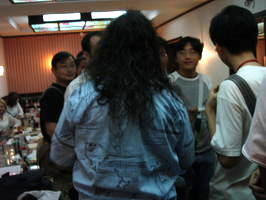
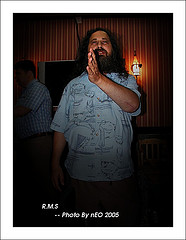
Treacherous computing all of them are consp impose on the public design public control of coures thery are also working together . So the likewise to some
When Treacherous Computing hardware is available, people should buy and return them the next day. And if a lot of people do this,